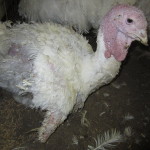This Meat Company Dumps More Pollution Into Waterways Each Year Than ExxonMobil
 Tyson Foods, one of the largest producers of meat in the world, is responsible for dumping more toxic pollution by volume into U.S. waters than companies like Exxon and Dow Chemical, according to a new analysis from environmental advocacy group Environment America. The analysis, released last Wednesday, coincides with a decision by Tyson shareholders not to institute a new water policy that would have mandated the company keep better track of its water pollution both inside and outside of its direct facilities. I am not surprised, it looks bad for Tyson! But the public deserves to know the truth.
Tyson Foods, one of the largest producers of meat in the world, is responsible for dumping more toxic pollution by volume into U.S. waters than companies like Exxon and Dow Chemical, according to a new analysis from environmental advocacy group Environment America. The analysis, released last Wednesday, coincides with a decision by Tyson shareholders not to institute a new water policy that would have mandated the company keep better track of its water pollution both inside and outside of its direct facilities. I am not surprised, it looks bad for Tyson! But the public deserves to know the truth.
Why Is The US Government Conspiring Against Vegan Mayo?
In one email from August of 2013, American Egg Board (AEB) president Joanne Ivy referred to Just Mayo as “a crisis and major threat to the future of the egg product business.” The email went on to further state: “What are we doing at AEB in regards to this competing product? We need to have an answer!” These emails were made public following a Freedom of Information Act request put in by public records expert Ryan Noah Shapiro of MIT and his lawyer Jeffrey Light. Digital news outlet Quartz reached out to representatives of the AEB for clarification of the emails but were not granted a response. AEB’s Ivy did, however, tell the Associated Press that the board “bolstered efforts to increase the demand for eggs and egg products” to compete with the rise in popularity of egg substitute products such as Just Mayo.
Support for Breast-Feeding, in a Multitude of Ways
 Today, more than three-fourths of women start to breast-feed, although more than half end up weaning their babies sooner than they would have liked, often short of six months. Working women rarely get more than six weeks of paid maternity leave, and once back at work, the obstacles to expressing and storing breast milk can be daunting. Both mother and baby benefit from breast-feeding. Women who breast-feed have a lower than average risk of developing breast cancer, ovarian cancer, diabetes, hypertension and heart disease later in life. Breast-fed infants enjoy greater protection from infections, sudden infant death syndrome and metabolic disease. Babies born prematurely especially benefit from breast milk, which lowers their risk of infections, especially necrotizing enterocolitis, a serious intestinal disease.
Today, more than three-fourths of women start to breast-feed, although more than half end up weaning their babies sooner than they would have liked, often short of six months. Working women rarely get more than six weeks of paid maternity leave, and once back at work, the obstacles to expressing and storing breast milk can be daunting. Both mother and baby benefit from breast-feeding. Women who breast-feed have a lower than average risk of developing breast cancer, ovarian cancer, diabetes, hypertension and heart disease later in life. Breast-fed infants enjoy greater protection from infections, sudden infant death syndrome and metabolic disease. Babies born prematurely especially benefit from breast milk, which lowers their risk of infections, especially necrotizing enterocolitis, a serious intestinal disease.

Comments are closed.